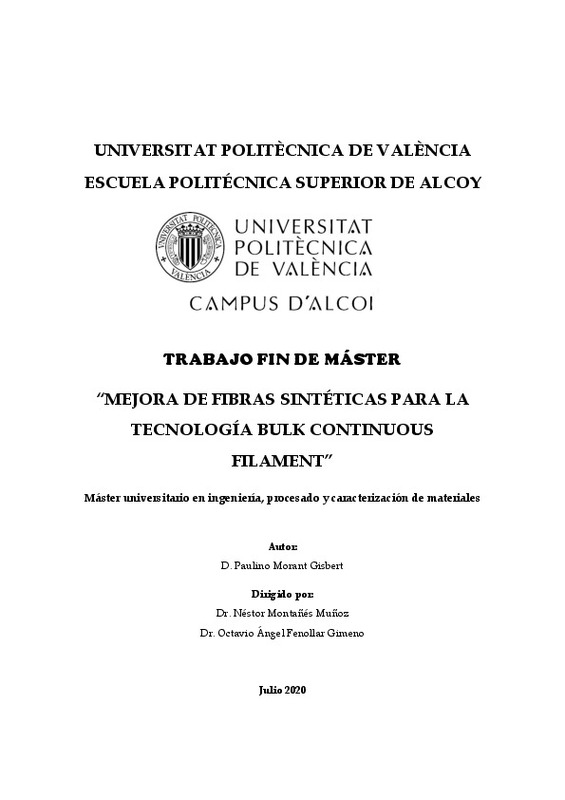|
Resumen:
|
[ES] El objetivo del presente proyecto es desarrollar hilos voluminizados mediante los cuales obtener alfombras y moquetas empleando materiales poliméricos de origen bio y/o reciclados.
En el desarrollo del proyecto, ...[+]
[ES] El objetivo del presente proyecto es desarrollar hilos voluminizados mediante los cuales obtener alfombras y moquetas empleando materiales poliméricos de origen bio y/o reciclados.
En el desarrollo del proyecto, primeramente se realizarán muestras de compounding empleando diversos materiales. Estas muestras de compounding serán caracterizadas llevando a cabo toda una serie de estudios y análisis, como la Calorimetría Diferencial de Barrido (DSC), Análisis Termogravimétricos (TGA), estudios reológicos, o el cálculo del Índice de Fluidez MFI. Con estas caracterizaciones se comprobará que mezclas son las más adecuadas para continuar el proceso y pasar a la hilatura multifilamento donde se obtendrán los hilos en su estado más primario. Una vez se obtengan los hilos de los materiales elegidos, estos serán texturizados empleando las tecnologías TASLAN y BCF, para buscar un voluminizado de las fibras y que éstas se asemejen a las que se emplean en el mercado de la alfombra. Por último, de los hilos con mejores propiedades se realizarán prototipos de alfombras empleando la tecnología tufting y la de calada para generar prototipos de backings .
En cada una de las fases (compounding, hilatura multifilamento, texturizados TASLAN-BCF y tejedurías de calada y tufting) se efectuarán caracterizaciones para comprobar la calidad y las propiedades de las muestras obtenidas.
[-]
[EN] The objective of this project is to develop volumized yarns through which to obtain carpets and rugs using bio and/or recycled polymeric materials.
In the development of the project, first samples of compounding will ...[+]
[EN] The objective of this project is to develop volumized yarns through which to obtain carpets and rugs using bio and/or recycled polymeric materials.
In the development of the project, first samples of compounding will be made using various materials. These compounding samples will be characterized by carrying out a series of studies and analyzes, such as Differential Scanning Calorimetry (DSC), Thermogravimetric Analysis (TGA), rheological studies, or the calculation of the MFI Flow Index. With these characterizations, it will be verified which mixtures are the most suitable to continue the process and go to the multifilament spinning where the yarns will be obtained in their most primary state. Once the yarns of the chosen materials are obtained, they will be textured using the TASLAN and BCF technologies, to look for a volumizing of the fibers and that they resemble those used in the carpet market. Lastly, from the yarns with the best properties, prototypes of carpets will be made using the tufting technology and the puff technology to generate prototypes of ¿backings¿.
In each of the phases (compounding, multifilament spinning, TASLAN-BCF texturing and openwork weaving and tufting) characterizations will be carried out to check the quality and properties of the samples obtained.
[-]
|







